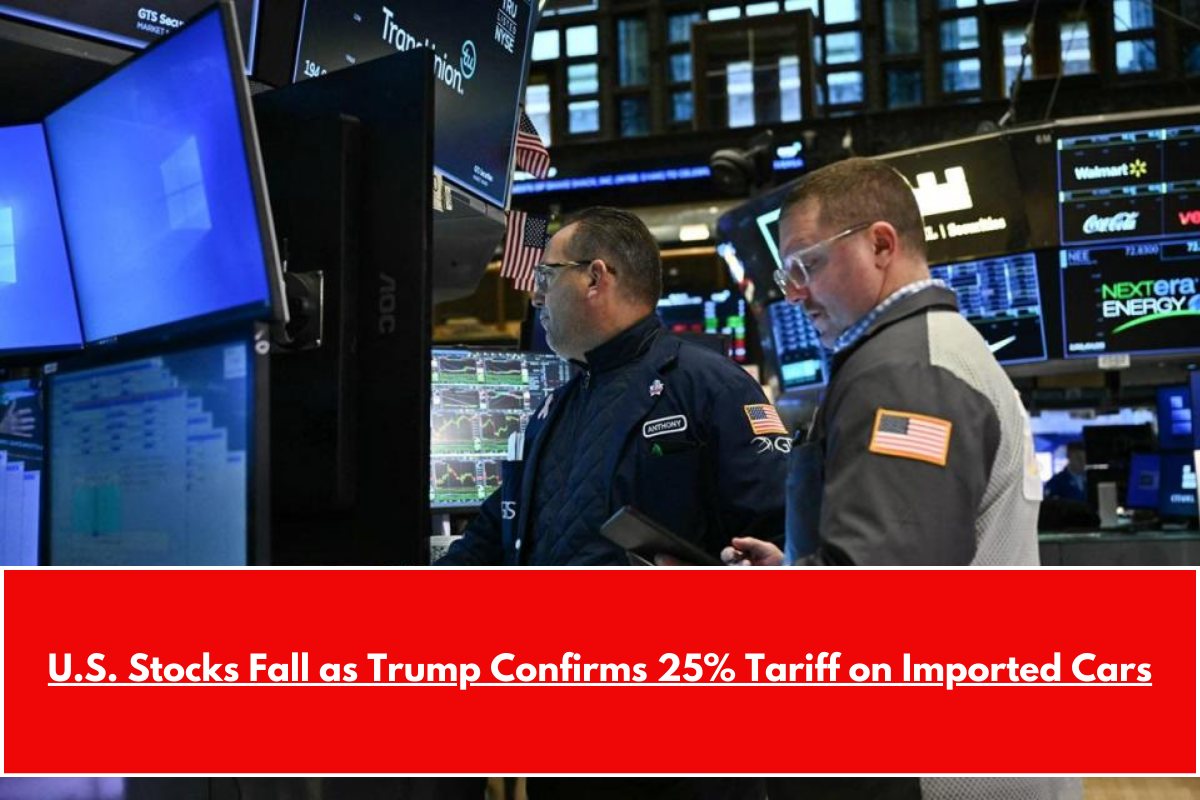Stock markets in the U.S. dropped sharply on Wednesday after the White House signaled that President Donald Trump would announce more tariffs, this time targeting imported automobiles. Investors reacted quickly, with many pulling money out of major companies, especially in the automotive and technology sectors.
This new move is part of Trump’s bigger plan to protect U.S. industries and encourage foreign companies to build in America rather than import goods.
What Happened to the Stock Market?
The announcement caused stocks to skid in afternoon trading:
- S&P 500 fell by 64 points (1.1%), closing at 5,712
- Dow Jones Industrial Average dropped 0.3%
- Nasdaq Composite slipped 2%
The biggest impact was seen in tech stocks and automaker shares, as the market reacted to the uncertainty that new tariffs usually bring.
Trump’s New Tariff Plan
Speaking from the Oval Office, President Trump confirmed a 25% tariff on all vehicles imported into the U.S.
He stated, “This will continue to spur growth like you haven’t seen before. If you build your car in the United States, there is no tariff.”
This is not the first tariff from the administration, but it is one of the most aggressive trade moves yet. The new tariffs will take effect on April 2, along with additional duties on imports from Mexico, Canada, and other trading partners.
Automaker Stocks Slide Before the Announcement
Even before Trump made the official statement, shares of automakers began to fall:
- General Motors dropped 3.2%
- Stellantis (which owns Jeep, Dodge, Chrysler, and Ram) fell 3.5%
- Tesla sank almost 6%, and is down 33% for the year, partly due to poor sales and CEO Elon Musk’s political involvement
Car manufacturers in the U.S. often rely on parts from other countries, so these tariffs will raise their costs and could hurt their profits.
Will Car Prices Go Up for Consumers?
Yes, experts say car prices may increase significantly for buyers. A report by Anderson Economic Group estimates that vehicle prices could rise by anywhere between $2,000 to $12,200, depending on the model.
This is because the import taxes (tariffs) are usually passed on to consumers, making cars more expensive.
Investors Worry About Long-Term Impact
According to Adam Crisafulli, head of the investment firm Vital Knowledge, Trump is committed to a “Tariff First” strategy, and very few advisors around him are pushing for caution.
He warned that even if tariffs help in the long term, they are likely to cause several months of slower economic growth and higher inflation in the short term.
The Federal Reserve and New Economic Warnings
The Federal Reserve, earlier this month, lowered its forecast for U.S. economic growth from 2.1% to 1.7%. It also warned that inflation is expected to rise, partly due to the impact of tariffs.
A report from Oxford Economics showed that tariffs could raise the prices of many household items like appliances, personal care products, utensils, and musical instruments, by up to 4%.
President Trump’s announcement of a 25% tariff on imported cars is part of his ongoing effort to bring more manufacturing back to the U.S. While this might help American factories in the long run, it is also expected to increase car prices, disrupt the stock market, and slow down the economy in the short term.
Investors and consumers alike will be closely watching the results of this policy as it unfolds in the coming months.


















Leave a Reply